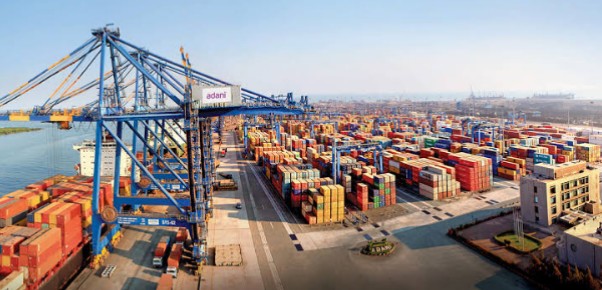Introduction for Adani Ports and SEZ –
Adani Ports and Special Economic Zone Limited (APSEZ) is a leading port infrastructure company in India, with operations spanning across the country’s coastline. The company operates a network of ten ports, including the country’s largest port in Mundra, as well as several special economic zones (SEZs) and logistics parks. APSEZ offers a range of services, including cargo handling, vessel management, and inland transportation.
The company is a subsidiary of the Adani Group, a diversified conglomerate with interests in various industries such as energy, logistics, and infrastructure. APSEZ has a reputation for state-of-the-art infrastructure and strong partnerships with global companies, and it has played a significant role in shaping India’s economic growth and international trade over the past two decades.
Although from last few days politically and financially some criticism are made against Adani Ports specially Hindenburg Report in January 2023 hampered the Adani Ports stock also but currently its fundamentals are not bad and future profit is good because of work orders. But Business model of Adani Group criticized by the experts due to excessive loan of the Company.
What does Adani Ports and SEZ do?
Adani Ports and Special Economic Zone (SEZ) is a subsidiary of the Adani Group, which is one of India’s largest conglomerates. Adani Ports and SEZ operates ports and terminals in India, including Mundra, Dahej, Hazira, Dhamra, and Kattupalli.
The company is primarily engaged in the business of operating and managing ports, terminals, and related infrastructure. It provides services such as cargo handling, storage, logistics, and customs clearance. Adani Ports and SEZ also operates Special Economic Zones (SEZs), which are designated areas that offer tax incentives and other benefits to companies that establish their operations within their boundaries.
In addition to its core port and SEZ business, Adani Ports and SEZ has also diversified into other areas such as logistics, agribusiness, and power generation. The company has a presence in multiple sectors and has been instrumental in driving the growth of India’s infrastructure sector.
What is Special Economic zone of Adani?-
A Special Economic Zone (SEZ) is a geographical region that has economic laws that are more liberal than the country’s typical economic laws. SEZs aim to attract foreign investment and promote exports by offering tax incentives, streamlined regulations, and other benefits to businesses operating within the zone.
The Adani Group’s SEZs offer infrastructure and facilities such as ports, airports, logistics, and energy that are essential for businesses to operate efficiently. These SEZs have attracted investments from a wide range of industries, including textiles, automobile components, plastics, and chemicals. The SEZs have also created employment opportunities for thousands of people in the regions where they are located.
In summary, the Adani Group’s Special Economic Zones (SEZs) are designed to provide a favorable business environment with tax incentives and other benefits to attract foreign investment and promote Indian businesses which boost the economy of India. The Adani Port has the most important port services where their future business is potential for investment with fundamentals.
What is Business Model of Adani Ports & SEZ?-
The business model of Adani Ports and Special Economic Zone Limited (APSEZ) is centered around the development, operation, and management of port infrastructure and related businesses. Here are some key aspects of APSEZ’s business model:
- Port Infrastructure Development: APSEZ develops and operates ports in India. The company has a diversified portfolio of ports, including bulk terminals, container terminals, and multi-purpose ports. APSEZ also invests in infrastructure development to expand the capacity of its ports.
- Special Economic Zone Development: APSEZ has also developed several Special Economic Zones (SEZs) in India, which offer tax incentives to companies operating within the zones. The company’s SEZs are focused on industries such as textiles, engineering, and IT.
- Logistics Services: APSEZ provides logistics services to its customers, including transportation, warehousing, and customs clearance. These services are integrated with its port and SEZ operations to provide end-to-end solutions to its customers.
- Diversified Business Portfolio: APSEZ has a diversified business portfolio that includes port operations, SEZ development, and logistics services. This enables it to offer a comprehensive range of services to its customers.
- Strategic Partnerships: APSEZ has formed strategic partnerships with leading global companies to develop and manage its ports. For example, it has a strategic partnership with CMA CGM, a global shipping company, to operate the Mundra Port.
Overall, APSEZ’s business model is focused on the development and management of port infrastructure and related businesses, with a strong emphasis on diversification, infrastructure development, and strategic partnerships.
What is the future prediction of Adani Port share?
Adani Ports and Special Economic Zone Limited (APSEZ) is a company that operates ports and related infrastructure. The company’s initial public offering (IPO) was launched in 2007, and since then, the company has engaged in various activities to expand its operations and increase its market share.
Some of the key activities of Adani Port share from IPO include:
- Expansion of Port Operations: Adani Ports has expanded its port operations through organic and inorganic growth. The company has built new ports and terminals, acquired existing port facilities, and entered into joint ventures with other companies to expand its business.
- Diversification of Services: Adani Ports has diversified its services to include logistics, warehousing, and other related activities. The company has also invested in the development of Special Economic Zones (SEZs) and other infrastructure projects.
- Acquisition of Foreign Assets: Adani Ports has expanded its presence outside of India by acquiring port assets in other countries. The company has acquired ports in Australia, Sri Lanka, and Bangladesh, among others.
- Strategic Partnerships: Adani Ports has formed strategic partnerships with other companies to expand its business and provide new services to its customers. The company has entered into partnerships with companies such as CMA CGM and MSC to provide container terminal services.
Overall, Adani Ports has focused on expanding its port infrastructure and related businesses, and has made strategic acquisitions to support its growth.
What is the purpose of special economic zone in India?
The Special Economic Zone (SEZ) is a geographical region in India that operates as a separate entity and is governed by different economic laws compared to the rest of the country. The primary purpose of SEZs in India is to promote exports and attract foreign investment in India by providing various tax and other incentives to the companies that operate within the SEZs.
The SEZ policy was introduced by the Government of India in April 2000 as a part of India’s Export-Import (EXIM) policy. The primary objectives of SEZs in India are:
- To attract foreign investment and promote exports: SEZs provide tax incentives, exemptions, and other benefits to companies that set up operations within the zones. This helps in attracting foreign investment and boosting exports.
- To create employment opportunities: SEZs generate employment opportunities by attracting businesses and promoting economic activities in the region.
- To promote infrastructure development: SEZs require the development of world-class infrastructure such as roads, ports, airports, and other facilities, which can have a positive impact on the surrounding regions.
- To encourage technological development: SEZs provide a conducive environment for research and development, innovation, and technology transfer, which can contribute to the growth of industries in the region.
Overall, the main purpose of SEZs in India is to boost economic growth and development by providing a favorable business environment and attracting foreign investment.
What is the Share Price & Market Cap of Adani Ports?
Due to Hindenburg report in January 2023 negative impact on Adani Ports share price also happened therefore market capital and share price of Adani Ports are hampered since last two months very badly. However, We can provide you with the latest available information as of my knowledge cut-off date, which is 22 March 2023.
As of March 2023, the share price of Adani Ports and Special Economic Zone Limited (APSEZ) was around INR 653.50 on the National Stock Exchange of India (NSE) and INR 654.95 on the Bombay Stock Exchange (BSE).
The market capitalization of Adani Ports as of 22 March 2023 was around INR 1.41 trillion on the NSE and INR 1.41 trillion on the BSE.
It’s important to note that stock prices and market capitalization can fluctuate frequently and may have changed significantly since you are reading this article. It’s always advisable to check the latest stock prices and market capitalization figures before making any investment decisions.
What are the features of Adani ports?
Adani Ports and Special Economic Zone Limited (APSEZ) is a port infrastructure company that operates several ports in India. Some of the features of Adani Ports are:
- Multi-Product Capability: Adani Ports has a multi-product capability, which means that it can handle various types of cargo, including coal, container, crude oil, petroleum products, and chemicals.
- Strategic Location: Adani Ports has strategically located ports along the Indian coastline, which provide easy access to major shipping routes and trade lanes. This enhances its competitiveness and ability to cater to the needs of global trade.
- State-of-the-Art Infrastructure: Adani Ports has state-of-the-art infrastructure, which includes modern cargo handling equipment, deep draft berths, and modern container terminals. This allows it to handle cargo efficiently and effectively.
- Strong Partnerships: Adani Ports has formed strong partnerships with leading global companies to develop and manage its ports. For example, it has a strategic partnership with CMA CGM, a global shipping company, to operate the Mundra Port.
- Sustainable Operations: Adani Ports is committed to sustainable operations and has taken several initiatives to reduce its carbon footprint and promote environmental stewardship.
- Diversified Business Portfolio: Adani Ports has a diversified business portfolio that includes port operations, SEZ development, and logistics services. This enables it to offer a comprehensive range of services to its customers.
Overall, Adani Ports is a leading port infrastructure company in India that offers a range of services and has a strong focus on sustainable operations and partnerships.
Critical Analysis of Adani Ports & SEZ –
Adani Ports and Special Economic Zone Limited (APSEZ) based on available information. Here are some potential strengths and weaknesses of APSEZ that can be considered in a critical analysis:
Strengths:
- Diversified Business Portfolio: APSEZ has a diversified business portfolio that includes port operations, SEZ development, and logistics services. This allows the company to offer a range of services to its customers and reduces its reliance on any single business.
- Strategic Location: APSEZ’s ports are located along the Indian coastline, which provides easy access to major shipping routes and trade lanes. This gives APSEZ a competitive advantage and enables it to cater to the needs of global trade.
- State-of-the-Art Infrastructure: APSEZ has state-of-the-art infrastructure, including modern cargo handling equipment, deep draft berths, and modern container terminals. This enables it to handle cargo efficiently and effectively.
- Strong Partnerships: APSEZ has formed strong partnerships with leading global companies to develop and manage its ports. This enhances the company’s reputation and allows it to leverage the expertise and resources of its partners.
Weaknesses:
- Dependence on Indian Market: APSEZ’s business is heavily dependent on the Indian market, which may limit its growth potential. A slowdown in the Indian economy or changes in government policies could impact the company’s financial performance.
- Regulatory Risks: APSEZ operates in a highly regulated industry, which exposes it to regulatory risks. Changes in environmental or safety regulations, or changes in government policies could impact the company’s operations and financial performance.
- Concentration of Customers: APSEZ’s customer base is concentrated, with a few large customers accounting for a significant portion of its revenue. This concentration increases the company’s risk exposure and may impact its financial performance if any of its major customers reduce their business with the company.
- Geopolitical Risks: APSEZ’s operations are based in India, which is exposed to geopolitical risks such as regional conflicts, political instability, and changes in government policies. These risks could impact the company’s operations and financial performance.
In conclusion, APSEZ has several strengths that have enabled it to become a leading port infrastructure company in India. However, the company also faces several risks and challenges that could impact its future growth and financial performance.
What is the Adani and Hindenburg controversy?
The Adani and Hindenburg controversy refers to a dispute between Adani Group, a conglomerate based in India, and Hindenburg Research, a financial research firm based in the United States.
In January 2023, Hindenburg Research published a report alleging that Adani Group had misled investors about the sustainability of its business model, particularly in relation to its port operations. The report accused Adani Group of engaging in “overstated financials, significant governance risks, and a track record of environmental and human rights abuses.”
The report also alleged that Adani Group had inflated the value of its port operations through related-party transactions and had failed to disclose key information to investors, such as the fact that it had been banned from bidding on certain port projects due to environmental concerns.
Adani Group denied the allegations made by Hindenburg Research, calling them “blatantly erroneous and misleading.” The company stated that it had always complied with regulatory requirements and had a strong track record of environmental, social, and governance practices. Adani Group also criticized by political close relations of Gautam Adani and their Government contracts regarding Adani Ports.
The controversy sparked a sharp decline in Adani Group’s share prices, with the company losing billions of dollars in market value in just a few days. The Indian government also launched an investigation into the allegations made by Hindenburg Research.
Conclusion for Adani Ports & SEZ –
While APSEZ faces risks and challenges associated with operating in a highly regulated industry and a volatile geopolitical environment, the company has demonstrated resilience and adaptability over the years, thanks to its state-of-the-art infrastructure, strong partnerships, and commitment to sustainability and good governance. As India continues to emerge as a major economic power and global trade hub, APSEZ is well-positioned to play a significant role in shaping the country’s future growth and development.



